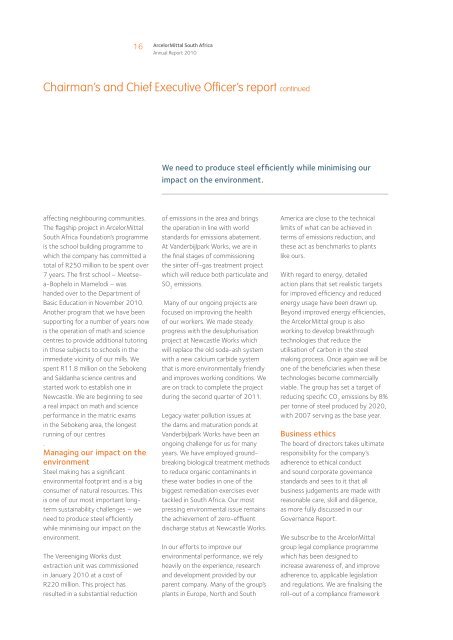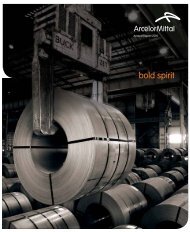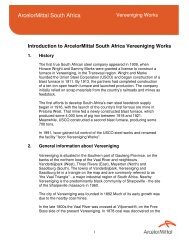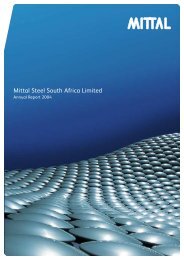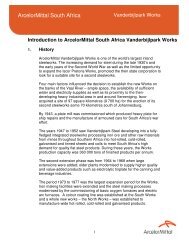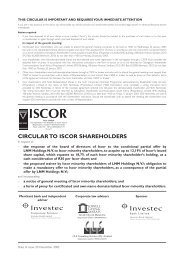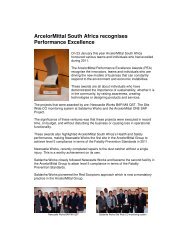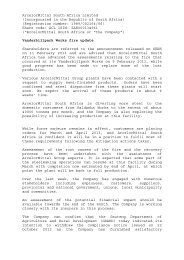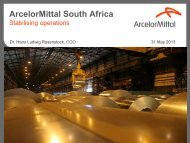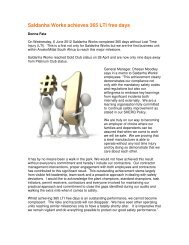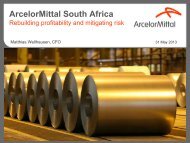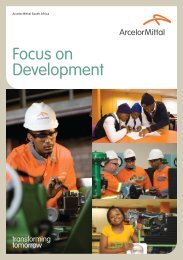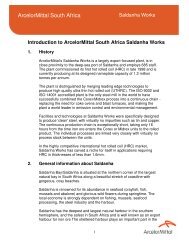bold spirit - ArcelorMittal South Africa
bold spirit - ArcelorMittal South Africa
bold spirit - ArcelorMittal South Africa
Create successful ePaper yourself
Turn your PDF publications into a flip-book with our unique Google optimized e-Paper software.
16<br />
<strong>ArcelorMittal</strong> <strong>South</strong> <strong>Africa</strong><br />
Annual Report 2010<br />
Chairman’s and Chief Executive Officer’s report continued<br />
We need to produce steel efficiently while minimising our<br />
impact on the environment.<br />
affecting neighbouring communities.<br />
The flagship project in <strong>ArcelorMittal</strong><br />
<strong>South</strong> <strong>Africa</strong> Foundation’s programme<br />
is the school building programme to<br />
which the company has committed a<br />
total of R250 million to be spent over<br />
7 years. The first school − Meetsea-Bophelo<br />
in Mamelodi − was<br />
handed over to the Department of<br />
Basic Education in November 2010.<br />
Another program that we have been<br />
supporting for a number of years now<br />
is the operation of math and science<br />
centres to provide additional tutoring<br />
in those subjects to schools in the<br />
immediate vicinity of our mills. We<br />
spent R11.8 million on the Sebokeng<br />
and Saldanha science centres and<br />
started work to establish one in<br />
Newcastle. We are beginning to see<br />
a real impact on math and science<br />
performance in the matric exams<br />
in the Sebokeng area, the longest<br />
running of our centres<br />
.<br />
Managing our impact on the<br />
environment<br />
Steel making has a significant<br />
environmental footprint and is a big<br />
consumer of natural resources. This<br />
is one of our most important longterm<br />
sustainability challenges – we<br />
need to produce steel efficiently<br />
while minimising our impact on the<br />
environment.<br />
The Vereeniging Works dust<br />
extraction unit was commissioned<br />
in January 2010 at a cost of<br />
R220 million. This project has<br />
resulted in a substantial reduction<br />
of emissions in the area and brings<br />
the operation in line with world<br />
standards for emissions abatement.<br />
At Vanderbijlpark Works, we are in<br />
the final stages of commissioning<br />
the sinter off-gas treatment project<br />
which will reduce both particulate and<br />
SO 2<br />
emissions.<br />
Many of our ongoing projects are<br />
focused on improving the health<br />
of our workers. We made steady<br />
progress with the desulphurisation<br />
project at Newcastle Works which<br />
will replace the old soda-ash system<br />
with a new calcium carbide system<br />
that is more environmentally friendly<br />
and improves working conditions. We<br />
are on track to complete the project<br />
during the second quarter of 2011.<br />
Legacy water pollution issues at<br />
the dams and maturation ponds at<br />
Vanderbijlpark Works have been an<br />
ongoing challenge for us for many<br />
years. We have employed groundbreaking<br />
biological treatment methods<br />
to reduce organic contaminants in<br />
these water bodies in one of the<br />
biggest remediation exercises ever<br />
tackled in <strong>South</strong> <strong>Africa</strong>. Our most<br />
pressing environmental issue remains<br />
the achievement of zero-effluent<br />
discharge status at Newcastle Works.<br />
In our efforts to improve our<br />
environmental performance, we rely<br />
heavily on the experience, research<br />
and development provided by our<br />
parent company. Many of the group’s<br />
plants in Europe, North and <strong>South</strong><br />
America are close to the technical<br />
limits of what can be achieved in<br />
terms of emissions reduction, and<br />
these act as benchmarks to plants<br />
like ours.<br />
With regard to energy, detailed<br />
action plans that set realistic targets<br />
for improved efficiency and reduced<br />
energy usage have been drawn up.<br />
Beyond improved energy efficiencies,<br />
the <strong>ArcelorMittal</strong> group is also<br />
working to develop breakthrough<br />
technologies that reduce the<br />
utilisation of carbon in the steel<br />
making process. Once again we will be<br />
one of the beneficiaries when these<br />
technologies become commercially<br />
viable. The group has set a target of<br />
reducing specific CO 2<br />
emissions by 8%<br />
per tonne of steel produced by 2020,<br />
with 2007 serving as the base year.<br />
Business ethics<br />
The board of directors takes ultimate<br />
responsibility for the company’s<br />
adherence to ethical conduct<br />
and sound corporate governance<br />
standards and sees to it that all<br />
business judgements are made with<br />
reasonable care, skill and diligence,<br />
as more fully discussed in our<br />
Governance Report.<br />
We subscribe to the <strong>ArcelorMittal</strong><br />
group legal compliance programme<br />
which has been designed to<br />
increase awareness of, and improve<br />
adherence to, applicable legislation<br />
and regulations. We are finalising the<br />
roll-out of a compliance framework


